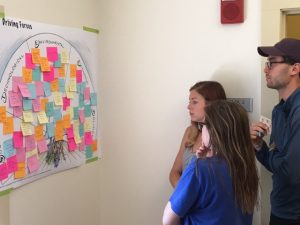One of the questions that is often asked about studying at the Middlebury School of the Environment is, “Aren’t there more exotic places in the world to travel and study than Vermont?” Inarguably, the answer to that question is “yes.” As I write this post, I can glance up to the wall in my home office and view the montage of photographs that record some of the many places around the world where I have had the privilege of working: Australia, Ghana, China, Slovenia, Brazil, and Costa Rica, to name a few.
But with respect to preparing myself to make a difference, to make the world a better place, none of them offer the depth of experience and the breadth of engagement as does Vermont. Vermont is a landscape where both cultural and ecological narratives visibly combine to shape current environmental conditions. Further, it is a place where investigation of environmental realities — through interviews with stakeholders and policymakers, and field study of the land and water — can easily lead to an exploration of possible futures.
Vermont is more than just a beautiful place. It is a place that almost uniquely lends itself to studying providing a foundation for understanding how one can help create a better, more sustainable future for all.
I’ve spent the past 30 years living and working here, developing an effective environmental curriculum and pedagogy that weave together stories of the people, land, and water of this place. The School of the Environment is a reflection of that. Another reflection is seen in my writing, often with my friend and colleague Chris McGrory Klyza. Chris and I recently published the 2nd edition of our book, The Story of Vermont: a natural and cultural history, which expands on all of why I think Vermont is the perfect place to travel and study.
We were recently interviewed about the book on the Vermont Public Radio show, Vermont Edition. If you want to hear more about what’s special about Vermont, have a listen.
